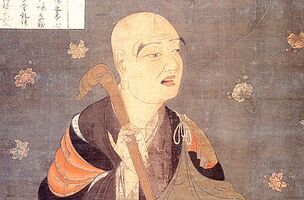Fazang
| PersonType | Category:Classical Chinese Authors |
|---|---|
| MainNamePhon | Fazang |
| SortName | Fazang |
| bio | Fazang is Zhiyan’s most accomplished and influential student, and became the third patriarch of Huayan. He is responsible for systematizing and extending Zhiyan’s teaching, and for securing the prominence of Huayan-style Buddhism at the imperial court. He is known especially for his definitive commentaries on the Avatamsaka Sutra and Awakening of Faith in Mahayana, and for making Huayan doctrines accessible to laity with familiar technologies such as mirror halls and wood-block printing. These contributions support the traditional regard for Fazang as the third patriarch of the Huayan School.
Fazang’s ancestors came from Sogdiana (a center for trade along the Silk Road, located in what is now parts of Uzbekistan and Tajikestan), but he was born in the Tang dynasty capital of Chang’an (now Xi’an), where his family had become culturally Chinese. Fazang was a fervently religious adolescent. Following a then-popular custom that took self-immolation as a sign of religious devotion, Fazang burned his fingers before a stupa at the age of 16. After becoming a monk, he assisted Xuanzang—famous for his pilgrimage to India—in translating Buddhist works from Sanskrit into Chinese. Fazang had doctrinal differences with Xuanzang, though, so he later became a disciple of Zhiyan, probably around 663 CE. Zhiyan’s access to the imperial court gave Fazang access to Empress Wu, with whom he quickly gained favor. He undertook a variety of public services, such as performing rain-prayer rituals and collaborating in various translation projects. He traveled throughout northern China, teaching the Avatamsaka Sutra and debating Daoists. He intervened in a 697 military confrontation with the Khitans, gaining further favor when Empress Wu ascribed to his ritual services an instrumental role in suppressing the rebellion. In addition, Fazang provided information to undermine plots by some of the empress’ advisors to secure power after her death. This secured Fazang’s status—and the prominence of Huayan teachings—with subsequent rulers. (Source Accessed Jan 28, 2020) |
| YearBirth | 643 |
| YearDeath | 712 |
| IsInGyatsa | No |
| Other wikis |
If the page does not yet exist on the remote wiki, you can paste the tag |
Fazang (Chinese: 法藏; pinyin: Fāzàng; Wade-Giles: Fa-tsang, 643–712) was the third of the five patriarchs of the Huayan school. He is said to have authored over a hundred volumes of essays and commentaries. He is famed for his empirical demonstrations in the court of Empress Wu Zetian. His essays "On a Golden Lion" and "On a Mote of Dust" are among the most celebrated ruminations from the Hua-yen school. Chinese Buddhist Huayan school.
Scholars have observed the influence of Taoism on Chinese Buddhism, and Fazang is believed to have drawn on a mode of thought derived from the I Ching.
References
Lai, Whalen (1980). "The I-ching and the Formation of the Hua-yen Philosophy". Journal of Chinese Philosophy 7: 245-258. Retrieved on 2007-07-28.

